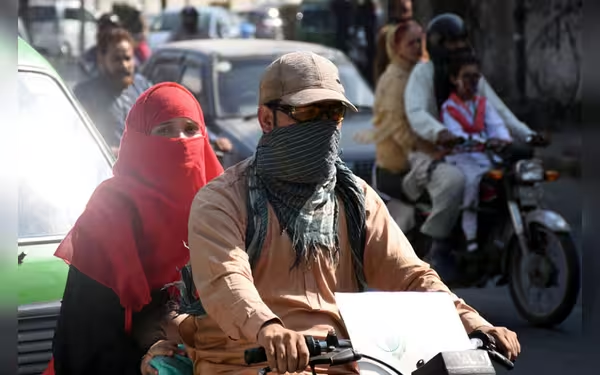Thursday, November 7, 2024 12:40 PM
Lahore Ranks Second in Global Pollution with AQI 220
- Lahore's AQI reaches alarming 220, second highest globally.
- Health officials urge residents to wear masks outdoors.
- LHC orders crackdown on polluting vehicles and smog measures.
 Image Credits: dailytimes_pk
Image Credits: dailytimes_pkLahore faces severe pollution with AQI 220, prompting health warnings and government action against smog.
Lahore, the bustling capital of Punjab, has once again found itself in the spotlight for all the wrong reasons. On Friday, the city was ranked as the "second most polluted city in the world," with an alarming Air Quality Index (AQI) reading of "220." This comes despite the implementation of a green lockdown in certain areas, aimed at curbing pollution levels. The situation is dire, with specific localities such as the Pakistan Engineering Society, Syed Maratab Ali Road, and Johar Town recording AQI levels of "256," "253," and "247," respectively.
The consequences of this pollution are being felt acutely by residents, many of whom are suffering from throat and chest infections. Medical professionals are urging individuals to wear facemasks whenever they step outside their homes to protect themselves from the harmful effects of smog. The situation is not limited to Lahore; nearby Narowal is also grappling with thick smog and fog, which has severely reduced visibility and created hazardous conditions for drivers.
In response to the escalating crisis, the Lahore High Court (LHC) has taken a proactive stance. During a recent hearing concerning smog-related issues, Justice Shahid Karim ordered a crackdown on long vehicles that contribute to air pollution. He instructed authorities to check buses and other vehicles, impounding those that emit excessive smoke. Furthermore, the judge proposed that schools could be closed for two days a week, and private sector employees might also be encouraged to work from home during this period. He emphasized the need for a complete ban on commercial activities on Sundays if the pollution levels do not improve.
Justice Karim acknowledged the provincial government's efforts to combat pollution but reminded officials that these actions were being taken under court orders. He directed the Lahore Waste Management Company (LWMC) to utilize water from mosques for washing roads, highlighting the importance of resourcefulness in tackling this pressing issue.
Meanwhile, the Punjab government is actively implementing a multi-sectoral action plan led by Chief Minister Maryam Nawaz Sharif to address the smog crisis. Senior Provincial Minister Marriyum Aurangzeb announced that disinfected water is being sprayed on roads in smog-affected areas, including Shimla Pahari, to mitigate the effects of pollution. Residents are encouraged to report high pollution levels by calling a designated number, ensuring timely action can be taken.
As the smog thickens, hospitals in Lahore are witnessing a surge in patients suffering from respiratory ailments. Reports indicate that hospitals are overwhelmed with cases of dry cough, asthma, and other respiratory issues, particularly among children and the elderly. The Health Department has noted a significant increase in patients visiting major hospitals, with Mayo Hospital alone reporting over "1,680 patients" in just 24 hours. Medical experts are advising individuals with respiratory conditions to remain indoors and take necessary precautions, such as wearing masks and protective eyewear.
In an effort to combat the smog, Lahore Police have intensified their enforcement campaign, registering "197 cases" and making "209 arrests" related to smog violations. This includes actions against the burning of harmful materials and construction-related offenses. The police are committed to ensuring that government Standard Operating Procedures (SOPs) for smog prevention are strictly followed.
As Lahore grapples with this environmental crisis, it is crucial for residents to remain vigilant and proactive in protecting their health. The collective efforts of the government, law enforcement, and citizens will be vital in overcoming this challenge. By adopting simple measures such as carpooling, reducing vehicle usage, and reporting pollution hotspots, individuals can contribute to a cleaner and healthier Lahore. The fight against smog is not just a governmental responsibility; it requires the active participation of every citizen to ensure a better quality of life for all.













